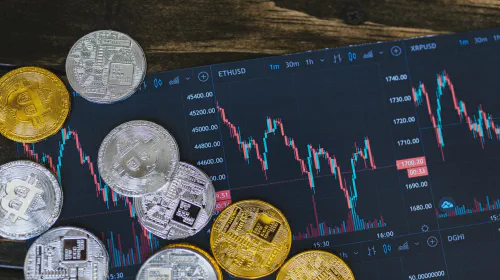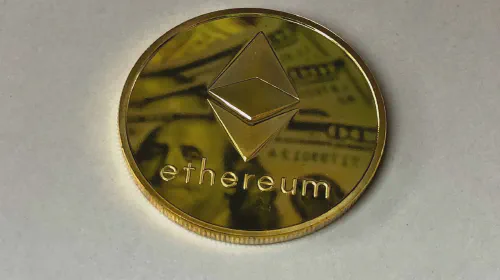Ethereum vs. Dogecoin - What's the Difference?
Salomon Kisters
Sep 30, 2022This post may contain affiliate links. If you use these links to buy something we may earn a commission. Thanks!
If you are new to cryptocurrency, you may have heard of Ethereum and Dogecoin but aren’t sure what they are or how they differ from each other. After all, there are hundreds of digital currencies out there, with new ones hitting the market almost every day. This article will explain what makes Ethereum and Dogecoin unique and how they compare with each other.
Symbol
- Ethereum: ETH
- Dogecoin: DOGE
Year of Launch
- Ethereum: 2015
- Dogecoin: 2013
Original Purpose
- Ethereum: Designed to market the decentralized network’s computing power
- Dogecoin: A parody of Bitcoin and the doge meme that was made in jest
Market Capitalization
- Ethereum: $196,257,000,867.40
- Dogecoin: $8,056,295,002
Number of Coins in Circulation
- Ethereum: 120 million (Aug 2022)
- Dogecoin: 132 billion (Aug 2022)
Maximum Number of Coins in Supply
- Ethereum: Unlimited supply, but the issuance of coins is predetermined
- Dogecoin: Unlimited supply, but annual issuance of coins is restricted to 5 billion coins
What is Ethereum?
Ethereum was created by Vitalik Buterin in 2013 as a blockchain-based distributed computing platform that allowed developers to build decentralized applications that can be used in a variety of industries.
Ethereum has its own cryptocurrency token called “Ether,” which can be traded on most cryptocurrency exchanges in the world. People can use Ethereum to create their own cryptocurrencies and raise funds with Initial Coin Offerings (ICOs).
Ethereum is a decentralized platform that runs smart contracts. In other words, it’s a blockchain-based application that can be used to build all kinds of decentralized applications. In terms of functionality, Ethereum is a lot like Bitcoin. However, Ethereum’s main differentiator is that it can be customized by a programmer (known as a “developer”).
Ethereum’s flexible programming language makes it possible for developers to create decentralized apps that can be used for a wide range of purposes. In fact, many experts believe that Ethereum has the potential to disrupt almost every industry on the planet. This makes Ethereum a much more versatile coin than Bitcoin. It also explains why so many new crypto projects are built on Ethereum today.
What is Dogecoin?
Dogecoin was one of the first altcoins to hit the market. Released in December 2013, Dogecoin is based on the same principles as other altcoins—it’s a peer-to-peer digital currency that can be used to purchase goods and services.
However, most people showed interest in Dogecoin mainly because they saw it as a fun alternative to other digital currencies. Its cheerful aura has also made it one of the best coins for beginners. Dogecoin gets its name from “doge,” an internet meme based on an “aww”-inducing picture of a Shiba Inu dog surrounded by nonsensical text. Its lighthearted nature has helped make Dogecoin one of the most accessible digital currencies out there.
Dogecoin is decentralized, open-source, and runs on a blockchain. In other words, it is a digital asset that can be sent or received by people all around the world. Dogecoin can be used to buy goods and services and traded for other currencies, as it has a relatively low value when compared to other altcoins. However, it can be a great choice for beginners who want to dip their toes into the world of cryptocurrency.
How are Ethereum and Dogecoin different?
Even though Ethereum and Dogecoin are both decentralized apps based on blockchain technology, there are a few key differences between the two that you should know about. First, Ethereum’s programming language is more robust, flexible, and scalable than Dogecoin’s programming language. In other words, Ethereum’s code makes it possible to create far more complex decentralized apps than Dogecoin.
Second, Ethereum’s decentralized apps have a higher level of security than Dogecoin’s decentralized apps. This is because Ethereum’s apps are built on a Turing-complete programming language, which is capable of performing any number of steps and loops to develop smart contracts.
Essentially this means that Ethereum’s decentralized apps are capable of performing complex calculations and processes that are not reliant on third parties to function. Dogecoin’s decentralized apps, on the other hand, aren’t capable of performing such complex processes.
Why do people care about Ethereum?
As mentioned above, Ethereum’s underlying code makes it possible to create decentralized apps that can be used for a wide range of purposes. This makes Ethereum very appealing to developers who want to create innovative apps or launch new blockchain projects. It also makes Ethereum attractive to businesses and entrepreneurs who want to use blockchain technology to streamline their operations.
Dozens of Fortune 500 companies have already begun exploring Ethereum’s potential. In fact, even the U.S. Department of Energy is researching Ethereum’s potential applications.
There is a wide range of different uses for Ethereum, and it is only expected to grow in the future. Ethereum is currently the second largest cryptocurrency after Bitcoin. It is often described as “the world computer” because it allows people to use blockchain technology to run decentralized applications on a single global platform.
Why do people care about Dogecoin?
Dogecoin was created by Billy Markus and Jackson Palmer in 2013 as a “joke currency” that had no real value. The pair wanted to create a parody of the Bitcoin ‘bubble’ and the ridiculous investors who were investing in Bitcoin at the time.
Like Ethereum, Dogecoin is based on blockchain technology. However, it doesn’t have the same functionality as Ethereum. Dogecoin doesn’t have a Turing-complete programming language, for instance. This means that it cannot be customized in the same way or extended to new developments in the crypto space.
On the other hand, Dogecoin’s simplicity makes it an excellent coin for beginners. It is also appealing to online merchants because, unlike many other digital currencies, it has a low transaction fee and can be used to process microtransactions easily.
Although Dogecoin may have started out as a joke, its success has led to it being taken seriously as an investment opportunity by many and not just those who were interested in its quirky beginnings.
Pros of Ethereum
The benefits of Ethereum include low transaction fees, fast transaction speeds, and a large user base. These factors make Ethereum a great choice for businesses that want to use blockchain technology to reduce costs and create more efficient operations.
Ethereum’s low transaction fees make it particularly attractive to businesses who are concerned about the high costs involved in making payments with cryptocurrencies. Moreover, Ethereum’s transaction speed makes it a great choice for many businesses. Its transactions can be completed in as little as 15 seconds, which makes it the right option for businesses that need to perform transactions quickly.
In addition, Ethereum has a large user base which ensures that it will remain in demand for years to come. A large number of people own Ethereum and use it for different purposes. This ensures that businesses will always have customers who want to buy and sell products using Ethereum.
Cons of Ethereum
The only significant drawback of Ethereum we can think of is its scalability issues. There is a significant debate on how and when these will be resolved. Ethereum has had these issues and network congestion since it was launched. This has eventually led to increased transaction times and high gas fees.
While Ethereum has addressed the scalability issue by introducing several new upgrades, such as sharding, Casper, and PoS, it will take time before these upgrades are implemented.
When it comes to security, Ethereum is one of the most secure blockchains in existence today. The network is secured by a complex setup of mining nodes that verify transactions and add them to the blockchain. Ethereum uses a Proof-of-Work (PoW) consensus algorithm that consumes significant amounts of energy. This means that it is not as environmentally friendly as the newer blockchains.
Pros of Dogecoin
The benefits of Dogecoin include a large community, low transaction fees, and fast transaction speeds. Dogecoin is successful and popular because it has a large community of users. Its users are regularly involved in charitable activities, and they are passionate about the growth and development of the altcoin. The transaction fees are low, making it highly attractive to investors who want to purchase low-cost coins, while transaction speeds are very fast. In fact, transaction times are usually shorter than those of Ethereum.
Cons of Dogecoin
One of the main challenges faced by Dogecoin is the rising competition from other cryptocurrencies. The cryptocurrency market is very competitive, and many new coins are being launched every month. These new coins are often more innovative than Dogecoin and offer lower transaction fees and faster transaction speeds. People who want to use Dogecoin for their businesses will likely consider the other cryptocurrencies that are available and choose the ones that are more innovative.
Dogecoin is also less secure than many other cryptocurrencies. The fact that Dogecoin has fewer users than other cryptocurrencies makes it easier for hackers to hack into user accounts. It is also less scalable than other cryptocurrencies, and this could impact businesses that want to use Dogecoin for their transactions.
Summary
One of the most widely-used cryptocurrencies in the world, after Bitcoin, is Ethereum. Ethereum.org aptly sums up the character of Ethereum in these words, “Ethereum is a technology that lets you send cryptocurrency to anyone for a small fee. It also powers applications that everyone can use, and no one can take down”.
While Ethereum is a well-known and widely used cryptocurrency, the Doge community still views Dogecoin as a fun hobby. However, using Dogecoin is an excellent way to try out cryptocurrencies and learn about them.
Stay informed with the latest insights in Crypto, Blockchain, and Cyber-Security! Subscribe to our newsletter now to receive exclusive updates, expert analyses, and current developments directly to your inbox. Don't miss the opportunity to expand your knowledge and stay up-to-date.
Love what you're reading? Subscribe for top stories in Crypto, Blockchain, and Cyber-Security. Stay informed with exclusive updates.
Please note that the Content may have been generated with the Help of AI. The editorial content of OriginStamp AG does not constitute a recommendation for investment or purchase advice. In principle, an investment can also lead to a total loss. Therefore, please seek advice before making an investment decision.

Can Algorand Be Like Ethereum, and Does It Have a Future?
Today, we will be closely looking at how Agorand compares with Ethereum and whether this new, emerging cryptocurrency has a prosperous future or not.

Ethereum vs. Cardano - What's the Difference?
Those who are well versed in the world of cryptocurrency undoubtedly know about the Cardano vs. Ethereum debate. Let's explore.

7 Reasons Why Ethereum Is Different From Bitcoin
In this article, we’ll look at the differences between Ethereum and Bitcoin and see where Ethereum improved upon its blockchain technology by learning from its predecessor.
Protect your documents
Your gateway to unforgeable data. Imprint the authenticity of your information with our blockchain timestamp